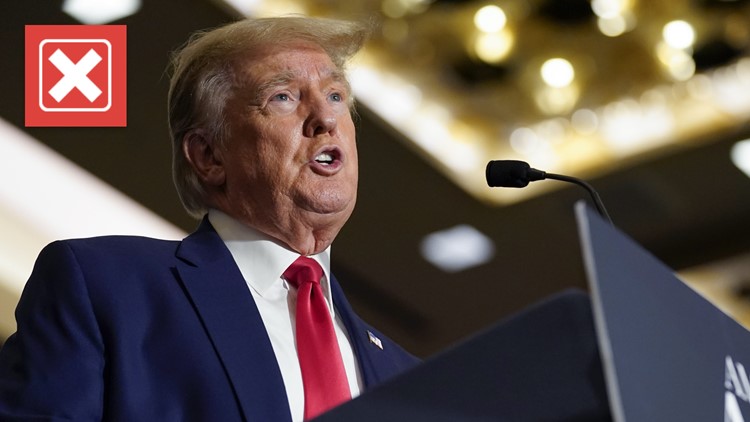On Aug. 9, FBI agents searched former President Donald Trump’s Mar-a-Lago estate as part of an inquiry into whether Trump or his staff took official documents from the White House to his estate after his presidential term was over.
Following the news of the search warrant being executed at the estate, people across social media asked if there are federal laws that would disqualify him from running for president again in 2024 if he were convicted of taking, concealing or destroying official documents.
Lawyer Marc E. Elias tweeted about the subject, sharing a screenshot of Section 2071 of Title 18 of the U.S. code, which states a penalty for concealing or destroying documents is a disqualification for holding public office.
Elias wrote: “The media is missing the really, really big reason why the raid today is a potential blockbuster in American politics.”
THE QUESTION
Would Trump be disqualified from serving as president again if convicted of concealing official documents?
THE SOURCES
- 18 U.S.C. § 2071
- The U.S. Constitution
- Presidential Records Act of 1978
- Congressional Research Service
- Barbara McQuade, law professor at University of Michigan’s Michigan Law
- Rick Hasen, author of the Election Law Blog and professor of law at UCLA School of Law
- Seth Barrett Tillman, law professor at Maynooth University in Ireland
- Lawfare Blog, a website dedicated to national security issues, published by the Lawfare Institute and the Brookings Institution.
THE ANSWER
No, Trump would not be disqualified from serving as president again if convicted of taking government records. That is because the Constitution sets the eligibility requirement for a presidential candidate, and a statute can’t change the rules set in the Constitution.
WHAT WE FOUND
A person wouldn’t be disqualified from serving as president unless they didn’t meet the qualifications outlined in the Constitution.
The Constitution lists only three qualifications for the presidency — the president must be at least 35 years of age, be a natural born citizen, and must have lived in the United States for at least 14 years. There is no mention of crimes involving government records as disqualifying someone from running for president in the Constitution.
18 U.S.C. § 2071 is a federal law that prohibits someone from destroying government documents. The statute says anyone who “willfully and unlawfully conceals, removes, mutilates, obliterates, or destroys or attempts to do so … shall be fined under this title or imprisoned not more than three years, or both … and shall forfeit his office and be disqualified from holding any office under the United States.”
Some of the tweets about this statute and its connection to the search of Trump’s home focus specifically on this line from the law: “[The person] shall forfeit his office and be disqualified from holding any office under the United States.”
But, that wouldn’t apply to Trump and his possible bid for president in 2024, UCLA Law Professor Rick Hasen wrote on his blog, Election Law Blog. That is because eligibility requirements for president are outlined and granted by the U.S. Constitution, which supersedes federal code.
“That statute [18 U.S.C. § 2071] cannot trump the Constitution, which sets the exclusive qualifications for President. So this is not a path to making Trump legally ineligible to run for office. (That’s a different matter than the political point— it is probably going to be hard for a convicted felon, if Trump is convicted of any felony, to be successful running for office.),” Hasen wrote.
Barbara McQuade, a law professor at Michigan Law, told VERIFY she thinks this statute would not withstand a constitutional challenge when applied to offices defined by the Constitution, such as president, vice president, senator or representative.
“It could apply to other offices, such as the Attorney General of the United States. If Donald Trump were to be convicted and then run for president, someone would have to challenge his eligibility. I believe that that challenge would fail under this statute,” McQuade said.
This is not the first time 18 U.S.C. § 2071 has been brought up with regard to someone running for president.
In 2015, some speculated then-presidential candidate Hillary Clinton violated the law and was disqualified from running for office because she used a private email server during her time as Secretary of State. She served as Secretary of State under President Barack Obama, from 2009 to 2013.
Seth Barrett Tillman, a law professor at Maynooth University in Ireland, penned a journal article on the topic of Clinton and said not only does this statute not apply to anyone running for president, but the Supreme Court has ruled Congress can’t alter eligibility requirements for the presidency. The Constitution does allow Congress to disqualify people from holding office in impeachment proceedings, Tillman wrote.
Clinton was never charged with crimes connected to her email server.
Presidential rules for official documents
There are rules in place that outline what a president or vice president can or can’t do with official documents and presidential records. The Presidential Records Act of 1978 (PRA) governs the official records of presidents and vice presidents that were created or received after January 20, 1981.
The PRA was enacted in 1978 after President Richard Nixon sought to destroy records from his presidency after his resignation in 1974.
The PRA changed the legal ownership of the official records of the president from private to public, making them the property of the United States and the American people.
The Presidential Records Act does not explicitly outline any penalties for violation, McQuade told VERIFY.
There hasn’t been any president, sitting or former, who has been charged or convicted of taking documents from the White House.
But, even if Trump were convicted of any of any felony, he could still run for president.



